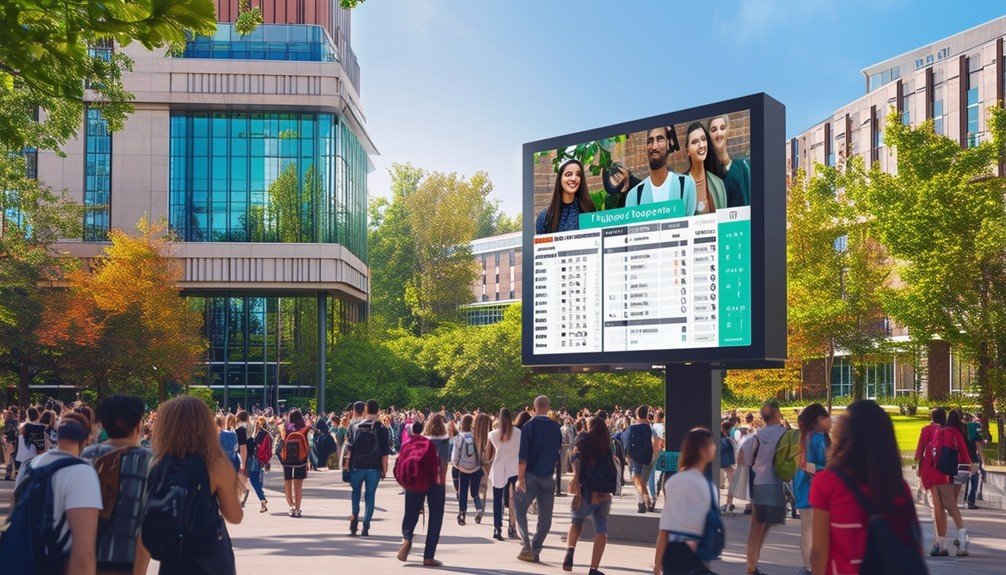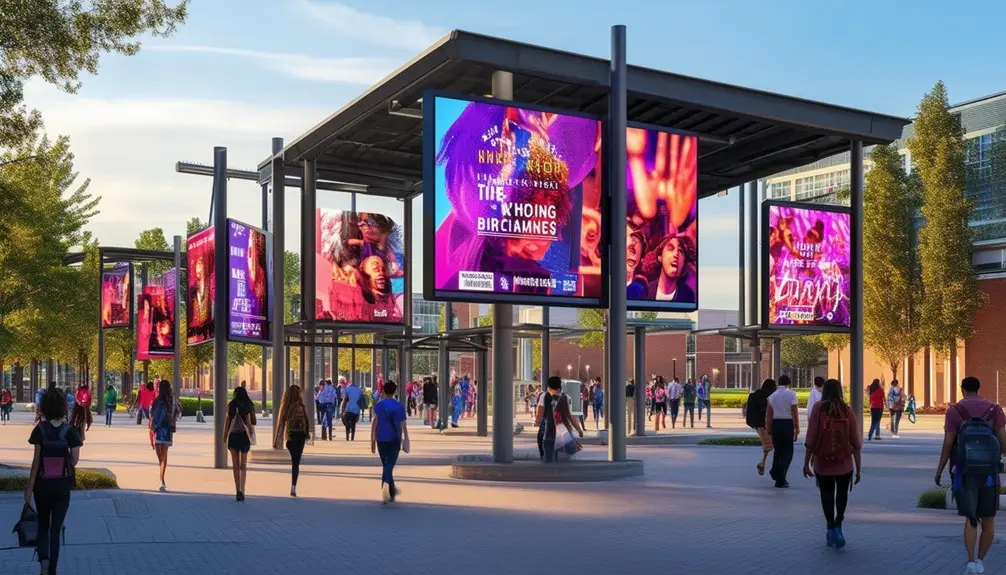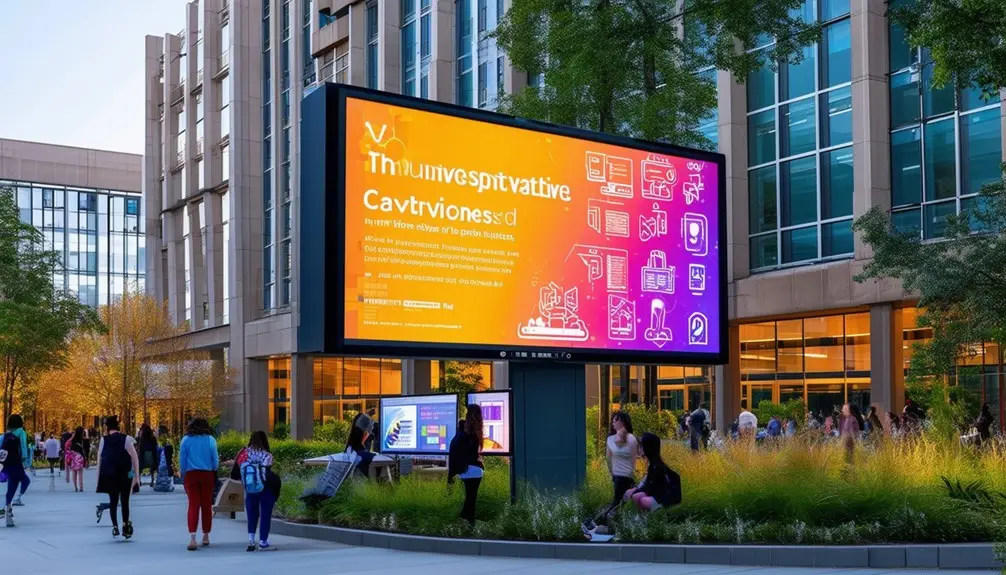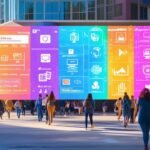To make your university events stand out, start by evaluating campus needs and understanding your audience. Place digital signs in high-traffic areas like student centers and libraries. Use clear, concise, and visually engaging content. Set SMART goals to measure success and regularly update your content. Include diverse information from different departments to keep it relevant. Engage students and faculty with interactive elements and real-time updates. Promote events and share emergency notifications swiftly. Effective digital signs can transform event communications on campus, making them more engaging. Explore further to see how these strategies can be implemented for maximum impact.
Key Takeaways
- Place digital signs in high-traffic areas like student centers to maximize visibility.
- Use clear, concise, and visually engaging content to capture attention.
- Include interactive elements to boost audience engagement and involvement.
- Update the content regularly through a content calendar for freshness and relevance.
- Provide real-time updates and emergency notifications to enhance communication efficiency.
Planning and Strategy

When planning digital signs for university events, you’ll need to start with a thorough evaluation of campus needs and a detailed audience analysis. Identifying what information is most relevant to students and faculty is crucial. Consider the types of events you want to promote and how digital signage can effectively showcase that content.
Begin by assessing the campus layout to determine prime locations for digital signage. High-traffic areas like student unions, libraries, and lecture halls are ideal spots. Make sure your digital signage content is clear, concise, and visually engaging to capture attention quickly.
Next, immerse yourself in audience analysis. Understand the demographics and preferences of your student body. This helps tailor the content to meet their needs and interests. Remember, effective content planning involves prioritizing information that is timely and relevant to your audience.
Utilizing digital signage software can streamline content management. This software allows for real-time updates and scheduling, guaranteeing your displays are always current. Planning also involves collaborating with event organizers to align the digital signage content with the event’s objectives.
Setting Goals
Setting clear goals for your university events guarantees that your digital signage strategy is focused and effective. You’ll want to define what you aim to achieve, which could include increasing event attendance, enhancing visibility, or boosting audience engagement. Once you’ve identified these objectives, you can create specific and measurable outcomes that ensure success.
Using SMART Goals (Specific, Measurable, Achievable, Relevant, Time-bound) is essential. Here’s how you can apply them:
- Increase Event Attendance: Set a target number of attendees for your event and use digital signage to promote it effectively.
- Improve Visibility: Aim to have your event information displayed in high-traffic areas to maximize exposure.
- Enhance Audience Engagement: Measure interaction rates with your digital signs to see how engaging your content is.
Content Strategy

Crafting a strong content strategy for your digital signs ensures that your messaging remains dynamic, relevant, and captivating for your university audience. Start by developing a content calendar, which will help you plan regular updates and keep your content current. Incorporating diverse information from various campus departments guarantees that your digital signs reflect a wide range of interests and activities, making them more attractive to a broader audience.
Visual design is vital in creating eye-catching graphics. Utilize consistent templates and layouts to maintain a professional look and feel across all your digital signs. This uniformity helps in building a recognizable brand identity for your university events. Don’t underestimate the power of interactive elements, such as QR codes or touch screens, which can significantly enhance audience engagement by providing an interactive experience.
Regular updates are necessary to keep the content dynamic and engaging. By frequently updating your digital signage, you avoid the pitfall of stale content that could lead to disinterest. Collaborate closely with various campus departments to gather relevant content, ensuring your digital signs are always populated with fresh and diverse information. By following these guidelines, you’ll create a compelling and effective content strategy for your university’s digital signs.
Choosing Locations

To maximize the impact of your dynamic content, strategically place digital signs in high-traffic areas like student centers, libraries, and cafeterias. These locations guarantee that your digital signage reaches the largest audience, promoting university events effectively.
Consider these key points when choosing event locations:
- Event Spaces: Place digital signs in auditoriums, theaters, and sports facilities to inform attendees about upcoming events. By positioning signs at these venues, you guarantee that participants are well-informed and engaged.
- Wayfinding and Information Points: Install digital signage near entrances and main pathways to help visitors navigate to event locations. Clear wayfinding aids improve the overall experience and ensure attendees reach your events without confusion.
- Audience-Specific Locations: Utilize departmental buildings or residence halls to target specific groups with event information tailored to their interests. This targeted approach boosts engagement and attendance for specialized events.
For outdoor events, weather-resistant digital signs in campus quads and common areas are essential. These outdoor locations are perfect for capturing the attention of passersby and increasing event visibility. By strategically placing digital signs in these high-traffic and audience-specific locations, you guarantee your university events are well-promoted and easily accessible.
Empowering Communication
Leveraging digital signs, universities can streamline communication by offering real-time updates and engaging visuals that captivate the campus community. Digital signage empowers communication by providing dynamic content that grabs attention and informs students, faculty, and visitors efficiently.
Using digital signs, you can promote university events and activities effectively. Eye-catching visuals and interactive elements enhance engagement, leading to higher attendance and participation. Additionally, these signs are essential for sharing emergency notifications, guaranteeing the campus community stays informed and safe during crises.
Strategically placing digital signs in high-traffic areas ensures maximum visibility and impact. These signs foster a connected and informed campus community, creating a cohesive environment where information flows seamlessly.
Here’s a snapshot of how digital signage can empower communication:
| Feature | Benefit | Impact |
|---|---|---|
| Real-time Updates | Immediate information dissemination | Keeps campus community informed |
| Engaging Visuals | Captures attention | Enhances communication and engagement |
| Promote Events | Highlights upcoming activities | Increases event attendance and interest |
| Interactive Elements | User interaction | Boosts engagement and participation |
| Emergency Notifications | Quick crisis communication | Ensures safety and swift action |
Incorporating digital signage into your communication strategy helps create an engaging, connected, and informed campus community.
Conclusion
Think of your digital signs as lighthouses guiding students through the dense fog of university life. With careful planning, clear goals, strategic content, and prime locations, your signs will shine brightly, cutting through the chaos and directing everyone to engaging events. It’s not just about displaying information; it’s about empowering a community, ensuring everyone finds their way to meaningful experiences. So, light up your campus—your digital signs are the beacons students need.
Frequently Asked Questions
What Makes Good Digital Signage?
Good digital signage catches your eye with high-resolution images and clear text. Interactive features boost engagement. Place signs in high-traffic areas for maximum visibility. Guarantee consistent design and branding, and use customizable displays for easy updates.
How Effective Are Digital Signs?
Digital signs are highly effective. They increase event attendance by up to 46%, engage 63% more people than traditional signs, and enhance brand awareness by 47%. You’ll find they’re also memorable, with 85% retention rates.
How Can I Improve My Digital Signage?
To enhance your digital signage, incorporate interactive elements like touchscreens and QR codes, use dynamic visuals, regularly update content, and track performance metrics with analytics tools. Guarantee your messages are clear and concise for better viewer understanding.
What Is Interactive Digital Signage?
Interactive digital signage lets you engage with displayed content via touchscreens, gestures, or sensors. You can navigate menus, access real-time information, and explore dynamic content, enhancing your experience and providing personalized interactions.





